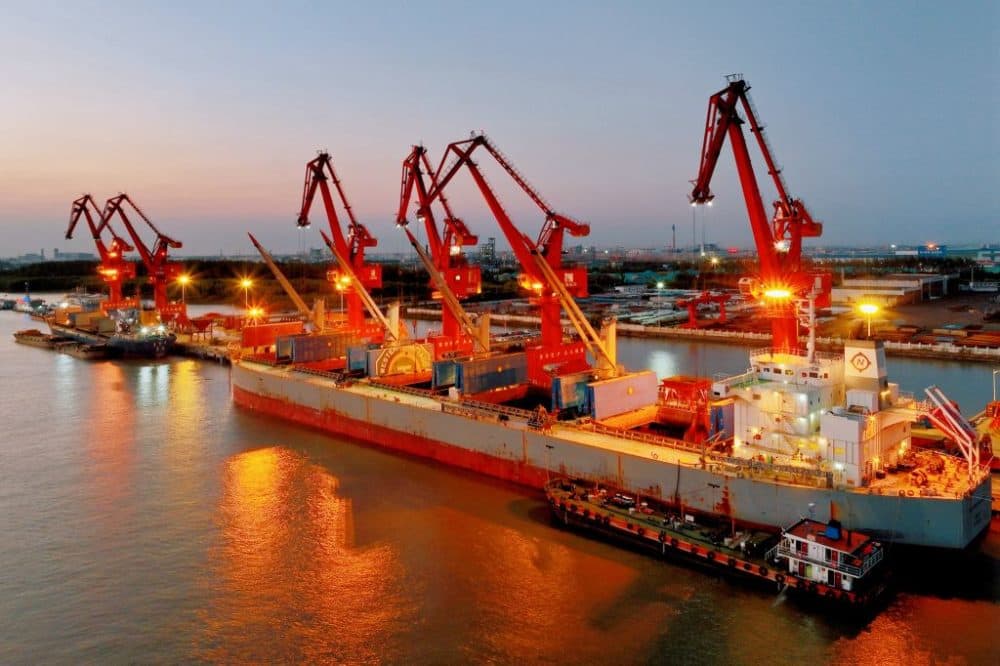Advertisement
Pres. Biden wants to end U.S. reliance on China. Could Beijing show us the way?
Resume
Sign up for the On Point newsletter here.
The U.S. and China are intertwined by trade.
But leaders in both nations want that to change. In Washington:
"We can't build a future that's made in America if we ourselves are dependent on China for the materials that power, the products of today and tomorrow," Pres. Biden said.
And in Beijing:
"They don't want to be held hostage by countries like the United States in particular, who they feel are trying to prevent China's rise," Willy Shih, professor in the technology and operations management unit at Harvard Business School, says.
And both nations feel they can protect their economic and national security in the same way — by pulling supply chains closer to home.
"Are we less likely to have a military confrontation if we can selectively decouple but keep enough dependency in our systems to avoid the conflict?" Elaine Dezenski asks.
Today, On Point: We take a look at what China calls its “dual circulation strategy," and Washington calls “decoupling." Will it work?
Guests
Hung Tran, nonresident senior fellow at the Atlantic Council’s GeoEconomics Center.
Elaine Dezenski, head of the Center on Economic and Financial Power at the Foundation for Defense of Democracies.
Also Featured
Willy Shih, professor in the technology and operations management unit at Harvard Business School. (@WillyShih_atHBS)
Interview Highlights
Let's start with the dual circulation strategy in China. What gave rise to President Xi's desire to create the strategy?
Hung Tran: "On the international front, they want to reduce the share of foreign trade driving China's GDP, so that China will be driven more internally and less externally. And secondly, they want to diversify their trade partners. So that they will trade less and less with the U.S. and Europe, and more and more with developing countries.
"And I have to say that if you look over the past decade, China has made very good progress along those two objectives that they have identified. Trade as a share of GDP declined from 64% of GDP ten years ago now to 37% today. So, it's a big decline, almost 30%.
"Whereas in terms of trade diversification, the trade between China and the Belt and Road Initiative, participating countries, is about $1.6 trillion a day. Overwhelming trade between China and U.S. about $650 billion. Trade between China and the European Union, about $700 billion. I think China has making good progress in meeting, achieving both the goals that they set out for the international front of the dual circulation."
On whether increasing China's domestic market is the same as reshoring supply chains
Hung Tran: "Yes and no. Because, again, they make it dual circulation to show the close and intricate relationship between the foreign activity and domestic activities in driving the Chinese economy. They want to harness it in the way to benefit value added production within the Chinese economy. In other words, they want to change trade volume and trade pattern, but they also want to improve the quality of trade.
"In the sense of China over the past year also has been able to increase the demand for Chinese value-added input into the export of third countries. But at the same time reduce the value added produced by foreign countries in China's own export. In other words, more and more of these high value-added [activities] have taken place inside China as part of this Made in China 2025 plan."
That sounds remarkably similar to what President Biden announced in his executive order last year. Right?
Hung Tran: "Right. Absolutely right. The only difference is that China has started ten years ago or more, a decade or two ago. And we are just being aware of these challenges, and this problem and have taken steps to start it now. So, we are already a latecomer."
On the United States' reason for ending reliance on China
Elaine Dezenski: "This is really within a framework of national and economic security. So, if you look at what happened last week with the new export control announcements from the Biden administration, essentially limiting semiconductor technology from being exported to China or used in China or U.S. persons aiding Chinese companies, it's really within the framework of national security. The concern about the use of semiconductors and related technology for China's military modernization, and how certain types of technologies, especially surveillance, could be used to endanger human rights in China.
"So, this is a very different framing. It's not just about competition between the U.S. and China. That's certainly part of it. But you see this national economic security frame coming forward. So that's quite different than where China is. Now, at the end of the day, are we talking about policies that are leading us closer to something like an economic warfare between the U.S. and China? I would say yes."
Tools of trade have often ideally been used as the tools for peace. Are we at risk of losing that claim?
Elaine Dezenski: "I think we are at risk. There's a restructuring underway. And I think we're seeing the first real pieces of that with the changes around the semiconductor supply chain and those dependencies, rethinking those dependencies. But we're going to see more of this, or we're certainly going to see it for a long time around energy and what that looks like going forward. Green energy supply chains. What kinds of dependencies will we have in the U.S.? Where can we mitigate that, so we don't go from dependency on oil to dependency on components for green energy that become a political risk for us.
"But I think what's behind all of this is real concern, at least from the U.S. side, around the rules of the game. And what a rules-based order is going to look like in this world that we're now kind of redefining? And behind that is a clear ideological difference in terms of how China, as an ascendant power, thinks about its political systems and dynamics.
"They've opened their market, but they have not moved towards a more democratic process in their politics. And that is of great concern to the U.S. and it should be. So, what we see is this intermingling of economic and political dynamics, and the impact on industries and workers and the very painful and challenging questions around where we may need to decouple for what reasons, and ultimately what the impact will be."
This program aired on October 12, 2022.

